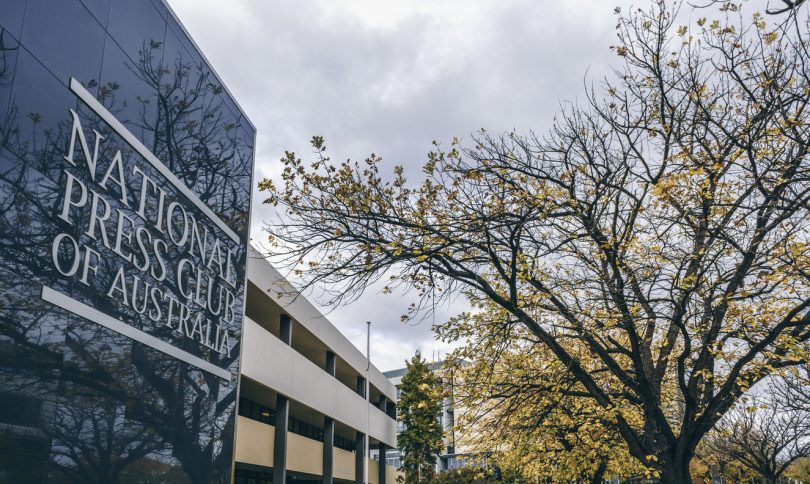
Increasing security reach is designed to intimidate. Photo: AFP.
In what is becoming a disturbingly familiar scene, Australian Federal Police officers turned up at a Griffith home last week, searched the property for evidence and left hours later carrying garbage bags and cases of material.
An AFP spokesperson would not say who the target of the raid was, only that the search warrant was related to a Commonwealth official.
Well, journalists soon found out who lived there, feeding speculation that it could be linked to a June raid of News Corp political journalist Annika Smethurst’s Canberra home after she wrote an article suggesting the Australian Signals Directorate was seeking to broaden its powers to spy on Australian citizens without their knowledge.
The owner of the Griffith home, Cameron Gill, is an Australian Signals Directorate officer, who is married to Australia’s Ambassador to Iraq, Dr Joanne Loundes.
The AFP spokesperson said reassuringly that the “activity does not relate to any current or impending threat to the Australian community”.
But that is where the AFP is wrong. I don’t feel safer for the raid, and the sight of such an operation about which next to nothing is being revealed should send a chill down the spine of every journalist and potential whistleblower, which despite the protestations of Home Affairs Minister Peter Dutton, is exactly what it is intended to do.
The raid on the ABC’s head office in Sydney, hard on the heels of the Smethurst operation, over a series of stories known as the Afghan Files, put the press and bureaucracy on notice that leaks and leakers would not be tolerated, and journalists would not be immune.
Governments since the 9/11 terrorist attacks in 2001 have built an elaborate legislative edifice to give Australia’s security agencies the powers they argue are needed to keep the nation safe.
Law Council of Australia president Arthur Moses told the National Press Club last week that about 75 pieces of national security legislation had been passed by the federal Parliament since September 11, 2001, including provisions criminalising the disclosure and receipt of classified information.
It’s mission creep that is now being confused with keeping the Government safe, and free of embarrassment.
Mr Moses said the recent raids were a stark example of how far the pendulum had swung, and he called for greater legal protections for freedom of speech, freedom of the press and other fundamental rights.
“We are the only Western democracy without a charter of rights or a Human Rights Act,” he said.

Journalists seem more vulnerable to a vengeful Government. File photo.
There is whistleblower legislation but the raids, and the prosecution of former ACT attorney-general and prominent barrister Bernard Collaery over his role in revealing that Australia had spied on East Timor, show that it isn’t working and this Government is all about self interest, not the national or public interest.
It sees national security, just like immigration and refugees, through the political prism of its own survival and seeking whatever advantage it can over its opponents, happy to literally hold asylum seekers hostage to its electoral ambitions, and to appropriate the security narrative, cheered on by enthusiastic public servants such as Michael Pezzullo who took the unusual step of congratulating the AFP on its Smethurst raid and calling for the leaker in that case to be jailed.
It is obsessed with secrecy, labelling vast amounts of information as classified to avoid scrutiny and then distracting the AFP and security agencies from their primary roles to seal the leaks, punish whistleblowers and shoot the messengers.
The Australian media is not Wikileaks. They do not publish without considering the public interest and weighing the ramifications, and are not about to put Australians at risk. They are not the enemy.
Again last week the outgoing ASIO chief, Duncan Lewis, warned foreign interference presented a greater threat than terrorism, describing it as an “existential threat” to the nation. Ironically, he suggested that the Australian Signals Directorate should be given a domestic role, as canvassed in the Smethurst story.
It is a given that police and security agencies always seek more power to do their jobs, and sometimes that might be justified. But these are matters that need to be discussed in the light of day, not hidden behind Government walls.
That is the point, not that journalists and others are oblivious to the threats that we expect the police and others to deal with.
But keeping us safe does not mean dragging everybody across the moat into the castle and putting up the drawbridge to endure an eternal siege. It should be possible to balance national security with the public’s right to know, and our fundamental freedoms.
As many more eloquent have said, if we give up those freedoms and our way of life to be ‘safe’, then our enemies have won.
We need a more open and transparent government, not less. We need to protect journalists and their sources. We don’t need politicians and public servants banging the national security drum to conceal the truth. And we don’t need police raiding homes for dubious reasons.












